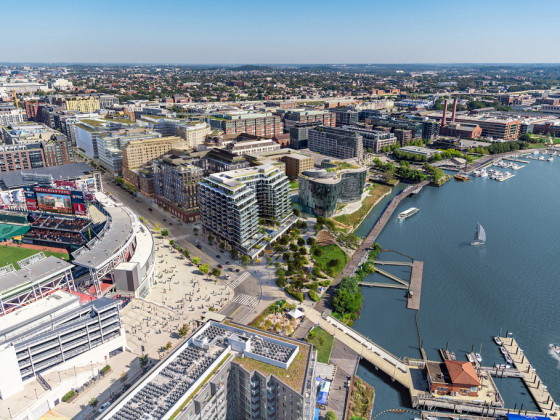What's Hot: Did January Mark The Bottom For The DC-Area Housing Market? | The Roller Coaster Development Scene In Tenleytown and AU Park
 Debate Heats Up Around DC's Proposed TOPA Law
Debate Heats Up Around DC's Proposed TOPA Law
✉️ Want to forward this article? Click here.
TOPA was back in the spotlight on Thursday as the DC Council Committee on Housing and Neighborhood Revitalization held a hearing on the much-ballyhooed TOPA Accessory Dwelling Unit Amendment Act of 2017, which would exempt certain homes from the Tenant Opportunity to Purchase Act (TOPA).
TOPA is DC’s controversial tenant-friendly law that gives renters the right of first refusal if the owner of the home or building where they are renting puts the property on the market. However, while the law has been successful in protecting residents of multi-family buildings from advantageous landlords and developers, whether it has worked as intended for owners and renters of single-family homes is debatable.
Consequently, the bill as initially proposed would exempt certain single family homes with accessory dwelling units from the law. In order to qualify for exemption, the home would have to contain two dwellings, the larger of which is occupied by the owner.
Experts and members of the community came out in force when the bill was discussed on Thursday, primarily to press for the Council to exempt all single-family homes from the law, a sentiment that Chairman Phil Mendelson shared.
“The problem that TOPA was meant to deal with was a problem that affects a large number of tenants of one building,” Mendelson stated. “When you’re dealing with one house here, one house there, we’re not talking about stability for housing for large numbers of residents.”
Several witnesses attested to the law’s efficacy at protecting vulnerable tenants and allowing them to either stay in their homes, negotiate repairs or rental rate assurances, or secure funds to ease a move-out. One witness who wanted to stand against any single-family home exemptions was Andrew Maguire of TOPA Market, who touted his legal services as a safety net to tenants.
story continues below
loading...story continues above
“If my average assignment fee is $30,000 with debt relief, with free rent, with counseling, that’s an extremely valuable asset to tenants, and to take that away from some of them is simply wrong and not justified by the data,” Maguire stated. The data he mentions is the low number of letters of interest filed by tenants over the past year compared to single-family homes for which TOPA notices were filed. “Ninety-nine percent of the sellers of tenant-occupied properties last year were in no way affected by TOPA,” he asserted, drawing laughs from the crowd.
The few witnesses who spoke in favor of minimal or no exemptions for single-family homes were vastly outnumbered by those who testified that the law is predatory toward homeowners and prospective homebuyers. Mendelson’s cross-examination of those who offered testimony raised questions: How many TOPA cases result in a sale of a single-family home to its tenant, and does TOPA reduce the amount of potential units on the market by discouraging homeowners from renting?
Despite which side of the argument they fell on, those who testified largely agreed that very few, if any, single-family home TOPA cases result in tenants purchasing the house, although there are no statistics on TOPA purchase rates for single-family homes. However, this may be because tenants, rather than lacking the desire to purchase, simply don’t have the financial resources.
As to whether TOPA discourages homeowners from renting portions of their house, many agreed that the law makes people hesitate to purchase in the city and also incentivizes listing units on Airbnb and other short-term rental sites to avoid potentially dealing with the TOPA law. “I think what TOPA does is make the owners second-guess whether they should be renting in the District,” Carol Calomiris, DC Association of Realtors’s co-chair on the TOPA task force, said to applause.
Chief Tenant Advocate Johanna Shreve noted that she would like to see more consideration given to the logistics involved in tenants being able to purchase the property if they are genuinely interested, opining that the city hasn’t done enough to ensure that renters are educated on exercising their rights properly rather than be preyed upon by the more legally-savvy. “The purpose of the program is to offer people the opportunity to own a home — not for someone to pay you to leave it,” she testified.
The aforementioned task force has made draft revisions to the bill to shorten the timeframes for TOPA steps and to expand the means by which notice can be given. Yesterday’s debate made it clear that this bill still has a ways to go to satisfy all those affected. The period for written public comment on the bill ends October 5th.
See other articles related to: dc council, right of first refusal, tenant rights, topa
This article originally published at https://dc.urbanturf.com/articles/blog/debate_heats_up_around_dcs_proposed_topa_law/13039.
Most Popular... This Week • Last 30 Days • Ever

As mortgage rates have more than doubled from their historic lows over the last coupl... read »

The small handful of projects in the pipeline are either moving full steam ahead, get... read »

Lincoln-Westmoreland Housing is moving forward with plans to replace an aging Shaw af... read »

The longtime political strategist and pollster who has advised everyone from Presiden... read »

A report out today finds early signs that the spring could be a busy market.... read »
DC Real Estate Guides
Short guides to navigating the DC-area real estate market
We've collected all our helpful guides for buying, selling and renting in and around Washington, DC in one place. Start browsing below!
First-Timer Primers
Intro guides for first-time home buyers
Unique Spaces
Awesome and unusual real estate from across the DC Metro














